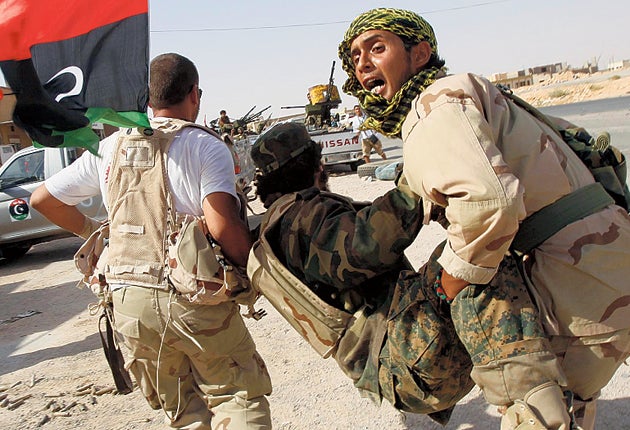Libyans fight for Bani Walid, street by street
Kim Sengupta witnesses the bloody battle for the loyalist stronghold as rumours emerge of a ‘fifth column’ among rebels

Your support helps us to tell the story
From reproductive rights to climate change to Big Tech, The Independent is on the ground when the story is developing. Whether it's investigating the financials of Elon Musk's pro-Trump PAC or producing our latest documentary, 'The A Word', which shines a light on the American women fighting for reproductive rights, we know how important it is to parse out the facts from the messaging.
At such a critical moment in US history, we need reporters on the ground. Your donation allows us to keep sending journalists to speak to both sides of the story.
The Independent is trusted by Americans across the entire political spectrum. And unlike many other quality news outlets, we choose not to lock Americans out of our reporting and analysis with paywalls. We believe quality journalism should be available to everyone, paid for by those who can afford it.
Your support makes all the difference.The pick-up trucks screeched to a halt in a cloud of dust and the fighters, some injured, some already dead, were brought out amid cries of "Allahu akbar". The assault on Bani Walid was proving to be a bloody and vicious business.
The skirmishes, street by street, continued hour after hour as rebels met fierce resistance as they attempted to drive out Muammar Gaddafi's forces from the town centre.
Controlling Bani Walid has become a matter of prestige for the revolutionaries after their claims that they had seized it proved false. The town, along with Sirte and Sabbha, remain defiant strongholds of the former regime and their stand in the face of rebel offensives and Nato air strikes has been used to taunt the new government by Colonel Gaddafi and his son, Saif al-Islam.
Yesterday, the loyalists at Bani Walid showed no signs of giving up the increasingly unequal struggle. Grad rockets and mortar rounds landed near us as we tried to advance with rebel fighters into the market place.
Yusuf Ali Badri had just scrambled out of the gun-mounted flat-bed truck when he was shot in the shoulder. Minutes later another member of the Tripoli Brigade was hit in the thigh.
There was panic and a brief retreat, followed by accusations of betrayal. "The firing came from behind us," shouted one man. "It is the Bani Walid brigade, you cannot trust them, they are with Gaddafi." Exiled fighters from the town fighting alongside the revolutionaries have been charged with putting loyalty to their tribe, the Warfallah, before the cause.
Ahmed Ivadullah, 23, a student and volunteer, said: "We have got fifth columnists who have infiltrated us and they are the ones stopping us from taking over this place."
Gaddafi's spokesman said loyalists had inflicted heavy losses on rebel fighters. "The battle is far from over," Moussa Ibrahim said in comments broadcast on Syria-based Arrai television station. "We have prepared ourselves for a long war. We have the equipment and the weapons."
The atmosphere of fear and suspicion began to affect refugees attempting to escape the fighting. A rebel shot out the tyres of a car which approached a checkpoint too fast. Three young men were dragged out and made to kneel on the ground.
Soon afterwards a salvo of rockets led to the rebels falling back three miles. The arrested men, their hands tied, were left in the tent where they were being interrogated. More than two hours later they were found, terrified, by journalists.
One of them, Amr Jawad Ibrahim, whispered: "They put a gun to my head and said they will kill me. My father and mother they are both old, are stuck in our home, and I just came out to try and get help. I don't know what I am supposed to do now, if I go back to my home I might get arrested by the Gaddafi men because they still control the area."
Last night, rebel commanders were planning a mission to take the town centre. A new officer had arrived from the capital and promised to "resolve the situation" within 24 hours.
However, he added: "Our political leaders keep on making promises. They made promises to Sarkozy and Cameron yesterday, and we have to fight and die to achieve them."
Former rebels get UN seat
The United Nations gave strong backing to Libya's former rebels yesterday, handing their National Transitional Council the country's UN seat and then lifting and modifying some sanctions imposed on the regime of former leader Muammar Gaddafi.
The Security Council unanimously approved a resolution establishing a new UN mission in Libya. The resolution also unfreezes assets of two Libyan oil companies, lifts a ban on flights by Libyan aircraft and modifies an arms embargo to allow Libyan officials now controlling the country to buy arms "intended solely for security or disarmament assistance."
Subscribe to Independent Premium to bookmark this article
Want to bookmark your favourite articles and stories to read or reference later? Start your Independent Premium subscription today.
Join our commenting forum
Join thought-provoking conversations, follow other Independent readers and see their replies
Comments